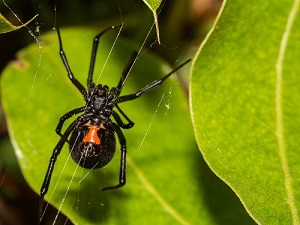If black widow spiders are present in your area of the country, please raise awareness with employees at least once a year during a safety meeting.

Often overlooked, injuries and deaths due to bees, spiders, and other insects are a concern that companies should manage as seriously as any other hazard in the workplace. Fatal on-the-job injuries do occur as a result of bites and stings from insects and spiders.
If employees are working outdoors or in any area where ants, insects, bees, wasps, ticks or spiders could be present, it would be a good idea to have an annual safety meeting on insects, bees & spiders. Topics should include how to recognize and avoid potential areas where insects may be lurking, what clothing is best to wear in the working environment, reminders to keep work areas clean and basic first aid tips if any employee is bitten or stung.
OSHA Standard 1926.21(b)(4) says that in job site areas where harmful plants or animals are present, employees who may be exposed shall be instructed regarding the potential hazards, and how to avoid injury, and the first aid procedures to be used in the event of injury.
Employers and workers don't give poisonous spiders much thought because encounters don't happen that often, even when working outdoors. But because of the amount of damage one tiny bite can inflict, if black widow spiders are present in your area of the country, please raise awareness with employees at least once a year during a safety meeting, emphasizing these important points.
- Inspect your work area before starting for signs of spiders or spider webs.
- Wear light-colored, smooth-finished clothing to cover as much of the body as possible.
- Make it a habit to keep work areas clean.
- Black widow spiders are identified by the pattern of red coloration on the underside of their body.
- They can often be found on sites containing undisturbed areas such as woodpiles, under eaves, fences, and other areas where debris has accumulated.
- Bites usually occur when humans come into direct contact with their webs.
- A bite from a black widow can be recognized by the two bite marks it makes in the skin.
- The venom produces pain at the bite area and then can spread to the chest, abdomen, or entire body.
- If you are bitten by a black widow spider (or even think you might have been bitten...) clean the bite area with soap and water, apply ice to the bite area to slow absorption of the venom, and seek medical attention immediately!
- If any insect bite causes severe chest pain, nausea, severe sweating, loss of breath, serious swelling, or slurred speech, seek immediate medical attention.
.jpg)

